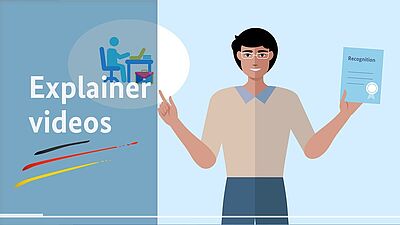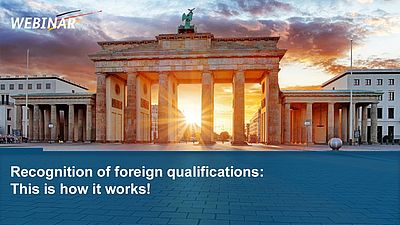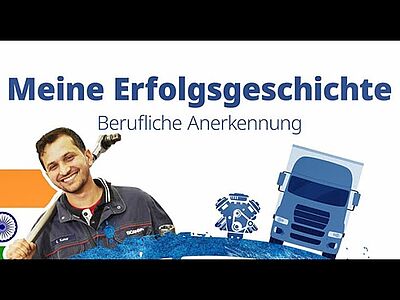
Recognition procedure
How does the recognition procedure work? During the recognition procedure, the competent authority checks whether your qualification is equivalent to the German reference occupation.
How does the recognition procedure work in Germany?
During the recognition procedure, the respective competent authority in Germany checks whether your foreign qualification is equivalent to a German one or whether there are substantial differences. The procedure is also known as “equivalence assessment” (Gleichwertigkeitsprüfung). The competent authority assesses, generally within three to four months, your documents as soon as they have all been submitted. To find out exactly how the recognition procedure works and where you can get specific information about your profession in Germany, please use the Recognition Finder (External link) in the skilled-worker section of the “Anerkennung in Deutschland” portal. There you have the option to immediately start finning in your online application, if available. On the “Anerkennung in Deutschland (External link) ” portal, you will also learn how the digital application process works and what you need to consider when filling out the application.
Result of the recognition procedure
Your foreign qualification will be recognised if it is equivalent to the German qualification. If substantial differences are identified in the equivalence assessment, then it depends on the type of profession:
In the case of non-regulated professions, the qualification is partially recognised if parts of the vocational training are equivalent, and others are not. A notice will be issued to you, stating the substantial differences compared to the German reference profession. Substantial differences are usually compensated by completing a refresher training. You can then submit a follow-up application to obtain the full recognition of your qualification.
In the case of regulated professions (academic and non-academic), the competent authority specifies a compensation measure that you will need to follow to compensate for the substantial differences. After you have successfully completed the compensation measure, the equivalence will be awarded. Afterwards, the further criteria for the license to practise a profession are then assessed.
The results of the recognition are communicated in an official notice called “Anerkennungsbescheid” (recognition notice). Learn whether you require the proof on the professional recognition for employment in Germany in the “Who needs recognition?” section.
Work and recognition combined
With the visa for a recognition partnership, you can enter Germany without the previous recognition. Then you can work in Germany and simultaneously go through the recognition procedure. Please find more information on this in the “Visa for a recognition partnership” section.
Use the Quick-Check to assess your employment options in advance, with or without recognition.
Qualification measure in the case of partial recognition
If you come from a non-EU country and substantial differences have been found during the equivalence assessment of your qualifications, you can obtain a residence title for the purpose of having your foreign qualifications recognised. This applies irrespective of whether the intended employment is in a regulated or non-regulated profession. This residence title allows you to enter Germany to complete a qualification measure. More information is available in the “Visa for the recognition of foreign qualifications” section.
The content of this qualification measure can vary greatly depending on your profession and level of knowledge. For example, you might learn job-related German or broaden your technical or theoretical knowledge. In regulated professions (e.g. health and nursing professions), you can take an adaptation period or an examination.
You can get advice about qualifications in Germany in advance. More on qualification measures and advice services on the topic of qualification can be found on the “Anerkennung in Deutschland” portal in the “What happens after the notice? (External link) ” section.
Once you have successfully completed your qualification measure, you can submit a follow-up application for the equivalence assessment to obtain the full recognition of your qualification.

Explainer video: How to achieve full recognition via qualification measures
Special case: execution of a skills analysis
Are you not able to present all documents on your foreign qualification? Under certain conditions, you can provide practical proof of your professional skills. For all dual vocational training professions, professions of Master craftspersons (“Meisterberuf”) and advanced training professions, this is possible with a skills analysis. The competent recognition body in Germany will decide whether a skills analysis is necessary. For more information, please visit the “Anerkennung in Deutschland (External link) ” portal.
Persons from non-EU countries who ware currently abroad can enter Germany for a skills analysis. More information on this can be found on our “Visa for the recognition of foreign professional qualifications” section.
Recognition procedure costs
The costs for the recognition vary depending on the profession. The recognition procedurce can cost several hundred euros. Please find more information on the “Anerkennung in Deutschland (External link) ” portal.
Information and advice services on the recognition procedure
Do you have questions, and you did not find answers, neither here nor on the “Anerkennung in Deutschland (External link) ” portal – especially in the Recognition Finder or their FAQ page? Then you can get advice on the recognition of your professional qualifications in Germany and abroad. This service is free of charge.
You can call or send an email to the “Working and Living in Germany” hotline of the Federal Office for Migration and Refugees (BAMF). Via this hotline, you can get initial information on the topic of recognition of foreign professional qualifications in Germany –in English and German.
For more in-depth advice and support during the recognition procedure you will be referred to an advice center in your area in Germany or to the Service Center for Professional Recognition (ZSBA) at the Federal Employment Agency (BA).
The counsellors of the ZSBA support you in compiling the required documents, filling in the needed application documents and communicating with the competent authorities up until entering Germany. That is how people seeking recognition can plan the endeavours in a goal-oriented way, avoid mistakes in the process and, therefore, save time. The advice service is non-binding and free of charge. Learn more about the service offers of the ZSBA (External link) . Additionally, you can directly contact the ZSBA via the email address recognition@arbeitsagentur.de.
In this video, you can learn how counselling for the professional recognition procedure in Germany works:

Advice on the recognition procedure in the countries of origin
Outside Germany, you can contact the advice centres of the ProRecognition (External link) project, aside from the ZSBA, for a more in-depth consultation on site. The advisors abroad are happy to support you in word and deed with any questions regarding the recognition procedure or language requirements, visas and job search. They are well connected to important partners in Germany and abroad, who pave the way to Germany for you. Aside from German and English, the respective native language of the country is spoken fluently. You can sue the filter in the counselling search (External link) to find an advice centre in your country. This service is free of charge as well.
Information on the web
- Federal Office for Migration and Refugees Hotline on “Recognition of foreign non-academic vocational qualifications”
- Recognition of qualifications in Germany How to have your non-academic vocational qualifications recognised and where to find your local contact centre
- Federal Employment Agency Search for regulated professions in Germany
- IHK FOSA (Foreign Skills Approval) National Centre of Excellence for the recognition and assessment of foreign non-academic vocational qualifications
- BQ Portal Information on foreign non-academic vocational qualifications and on foreign basic and advanced vocational training courses
- Network IQ Find an advice centre near you to have your international qualification recognized
Do you have any questions?
Let us advise you on your opportunities to work and live in Germany. Our experts will support you with questions regarding job search, visa, recognition and learning German.
You can find out more about the various contact options by clicking on one of the icons in the bar below.





